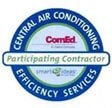Hard water. You’ve probably heard the term before, but may not have known its exact definition. Basically, hard water is water with a high mineral content. The most common minerals found in hard water are calcite, gypsum (which both contain calcium), and dolomite (a magnesium mineral). Hard water does not pose any serious health risks to drink; but it does pose serious health risks to your plumbing and any appliance hooked to it, like your water heater.
Your water heater in Plainfield, IL, can suffer damage from hard water that can require repairs or perhaps even a replacement. We’ll look at some of the problems hard water can cause. When you encounter malfunctions with your water heater—no matter the cause—call DuAll Heating & Cooling right away. We have emergency services available for when those hot water failures come at the worst time.
Hard Water and Your Water Heater
When hard water is raised to a high temperature, as occurs inside the tank of a water heater, it releases its minerals, which then develop along surfaces as limescale. Hard water entering a water heater’s tank will soon start to lay down a layer of limescale along the tank’s interior. Limescale works as an insulator, and this means it will unbalance the heat levels inside the tank, restricting heat from escaping and leading to overheating. An overheated tank will begin to spring leaks and may even rupture.
Another place where hard water can cause trouble for a water heater is when it causes a build-up of calcites on the surface of the heat exchanger of a gas-powered unit. These calcites will block the movement of heat from the combustion gas to the water in the tank, which will severely limit the ability to warm up the water, leading to a loss of hot water around the house.
Finally, the calcite deposits will start to develop inside the pipes leading from the hot water heater (indeed, it will affect pipes of all kinds around the house). The more the calcite deposits grow, the higher the pressure inside the pipes as the available room shrinks. This will lead to leaking at pipe connections that will continue to grow worse unless the issue is addressed.
Make Sure Your Water Heater is Regularly Maintained
There are a number of ways to deal with hard water, but here we are specifically concerned with the damage done to your water heater. Regular water heater maintenance is the best way to discover if calcite deposits or limescale are causing damage to your heater, and technicians can eliminate the problem by removing the build-up, or if necessary, replacing the heat exchanger. Technicians will also take care of leaks before they cause damage.
At DuAll Heating & Cooling, we’ll make it our priority to provide you with the best water heater service in the Plainfield area.












